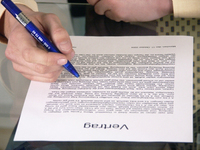How to prepare corporate documents with an apostille or legalisation?
Each country has its own kind of corporate documents. A good example it a trade register extract often used in the Netherlands. In the Netherlands it has a fixed format. In the United Kingdom a comparable document is called a certificate of incorporation. You can request the Companies House to add information such as directors’ names and registered office address. In the BVI certificates of incumbency are in use. Such certificates contain similar information as extracts only they are issued by notaries or registered agents.
In this article we will inform you on the trade register extracts, also called excerpts, and other commonly used Dutch corporate documents. Specifically we explain how to arrange a legalisation or apostille on the documents.
We can prepare many kinds of legal documents in only 1-3 days. You can contact ABiLiTieS' legal counsels for information and support.
Information you can find in a Dutch extract
Most used corporate document for Dutch companies is the extract of the trade register. All Dutch sole proprietors and legal entities can be found in the trade register of the Dutch chamber of commerce.
Extracts can be requested at the trade register both in electronical and in hard copy form. Extracts contain a treasure of information, such as:
- Registration number at Chamber of Commerce (CCI)
- Legal name
- Fiscal number (RSIN)
- Corporate seat
- Trade names (if any)
- Issued capital
- Paid up capital
- SBI codes
- Registered address
- Post address (if any)
- Date of incorporation
- Date of registration
- Date and year last filed publication accounts
- Name of the sole shareholder (if existing)
- Names of the director
- Authority of the director (sole or jointly)
- Attorneys (if any)
Can you legalise or notarise a trade register extract?
It is possible to have a Dutch notary certify an extract. Legalisation is not possible because the extract does not contain a wet ink signature. If the extract has been issued by the trade register printed on paper, it is possible to directly request the court for an apostille.
Most banks in the Netherlands accept scans of extracts and deeds of incorporation. Foreign banks often ask for notarised or legalised documents or to add an apostille.
The content of a deed of incorporation
Another key document is the deed of incorporation. Such deed contains the articles of the company and also referred to as ‘articles’. Next thereto the deed also contains information on the founder and notary. The deed ends with information of the initial directors, registered address, issued shares and shareholders.
After opening of a business, an extract and deed of incorporation are shared with you. A deed of incorporation is executed in Dutch and can be provided with an English office translation. Despite the fact the translation is not official, most banks accept the English version as it is been prepared by specialised translators.
How to a prepare a deed of incorporation with apostille
A deed of incorporation that is provided by a notary, is in fact a transcript of the original deed of incorporation, which is kept at the notarial office. Each transcript has a wet ink signature of the notary. The wet ink signature and the fact that all notaries are known with the Dutch courts makes it possible to directly obtain an apostille on the deed.
What is a Dutch register of shareholders?
A register of register of shareholders contains information on the issued shares, paid in capital, types of shares, shareholders details and pledges and usufruct on the shares.
A register of shareholders is prepared by the notary at incorporation. It is a responsibility of the board members to keep the register up to date. The register of shareholders shall be kept at the registered address of the company.
The register is not public and in case it gets lost it shall be reconstructed on the basis of all relevant notarial deeds. This can be deeds of incorporation, amendment of articles, share issue, share transfer, share pledge, etc.
How to a prepare a register of shareholders with apostille
Often the register of shareholders is in Dutch. It is recommendable to provide an English excerpt of the register signed by a board member if a non-Dutch bank or authority asks for the register of shareholders. It can save translation expenses.
In cases a register of shareholders with an apostille is requested this can be realised in two ways. Also, an intermediary step has to be taken. First a notarial certified copy of the excerpt or a notarial legalisation of the signature of the board member on the excerpt is prepared. Secondly an apostille can be obtained.
All the best bringing the information of this article in practise. You can alway contact us for guidance or preparation of your Dutch business' corporate documents.


